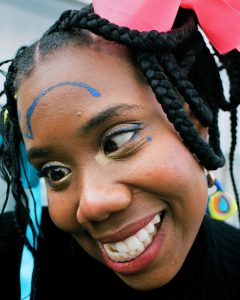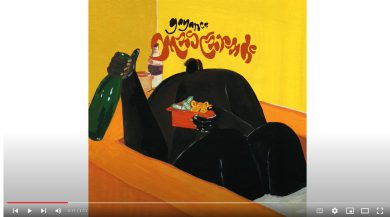“I’m trying to enjoy my time off, but it’s not working at all!” says Gayance over the phone, sounding slightly exhausted by the whirlwind pace she’s been caught in since arriving in Brazil. “I’m giving tons of interviews and there’s so much stuff to do!”

“There’s so much stuff to do”: that alone says a lot about what drives this Montréal-based singer-songwriter/producer, born Aïsha Vertus, of Haitian descent, who had to take care of a lot of business to finally be able to release her debut album, Mascarade, a deft amalgamation of jazz, house, R&B, and broken beat.
Her multiple professional lives have led her, among other things, to host video capsules, write articles, give lectures and DJing masterclasses, operate as a music consultant, curate exhibitions, make documentaries, and assemble hip-hop compilations… And all this while travelling all over the world and settling in a few cities – notably Brussels and Amsterdam—where she currently resides, between two trips to Montréal.
In short, relaxing doesn’t seem to be her forté. Mascarade, as a matter of fact, was initiated during an escapade-slash-artist residency in Sainte-Adèle, offered by PHI Centre, during which Gayance was supposed to mostly take it easy. “In my application, I said I needed a place to rest and experiment,” she says. “I absolutely didn’t chill for one second. I just can’t! Doing nothing is so hard… I compare myself to other artists, and I think that if I want to get to their level, I have to produce constantly. I’ve burned out many times!”
Thankfully, during that two-week stay in Sainte-Adèle (during which she ended up getting sick by alternating too often between the pool and the air-conditioned studio), Gayance found ways to calm herself. “I did a lot of mushrooms there, and my friend is a sound healer,” she says. “She uses Tibetan cymbals to create frequencies that help heal the spirit. I meditated with her for about 24 hours, on and off.”
That might be the reason why Mascarade is a more temperate, concise, and cohesive album than what one might expect from such an exuberant and hyperactive artist, with such a diverse range of talents. Just a couple of years after her debut as a producer, which she immortalized on her first EP No Toning Down (2021), Gayance has written the last chapter of this era of her life, with the release of her first official full-length album, on the London-based label Rhythm Section. The era in question started in the early 2010s, when the young artist was barely in her twenties.
“You think you’re invincible when you’re 20. You think you’re beginning your life, but it’s not actually the case. You’re still learning who you are, who your friends are, what your career is going to be. I have a 13-year-old younger sister who’s going to be 20 soon. This is my way of telling her my story.”
And that’s precisely where Mascarade stands out from the vast majority of electro or dance releases: the lyrics matter very much to Gayance, who stays far away from boring, repetitive calls to get on the dancefloor. The artist and her collaborators – Janette King, Judith Little D, and Hua Li, among others – offer meaningful songs based on true stories. While “Lord Have Mercy” recounts the sweet memory of a carnal romance, “Nuna Mais” conveys the sharp emotion of anger against a close friend. “Moon Rising (10 Years),” meanwhile, evokes in very few words Gayance’s interstellar ambitions. Paying homage to the memory of the late, great Jean-Jacques Dessalines, the title song celebrates Gayance’s Haitian origins while castigating white supremacy.
Gayance’s direct and deeply embodied poetry is perfectly married to the album’s straightforward, syncopated, twitchy rhythms, whose roots are firmly planted in the broken beat sub-genre.
Sharing her love for this brand of electronic music, created in the U.K. in the ’90s, Gayance connected with Emile Farley – an experienced bassist with whom she worked closely on Mascarade. Alongside them is David Ryshpan, a Montréal-based keyboardist, composer, and DJ who specializes in Afro-Latin jazz tones.
To guide everyone in the right direction, Gayance tapped into her cultural and spiritual legacy, especially that of her late grandfather, a musician she greatly admires. In addition to being one of the pioneers who introduced congas in Québec churches – at a time when the instrument was very much associated with voodoo rites – her grandfather taught her one of the most important things in his life.
“He told me it’s important to be aware of your own intentions. I’m not a Catholic, but I do have a spiritual side. I know that if I say something, [there is a possibility that] it will happen,” says Gayance. “When I DJ, I’m trying to bring people back to partying, but also to the spirit, and their intentions.”
Over a decade after her first steps on Montréal’s underground scene, with clearer intentions than ever, Gayance is taking flight.
